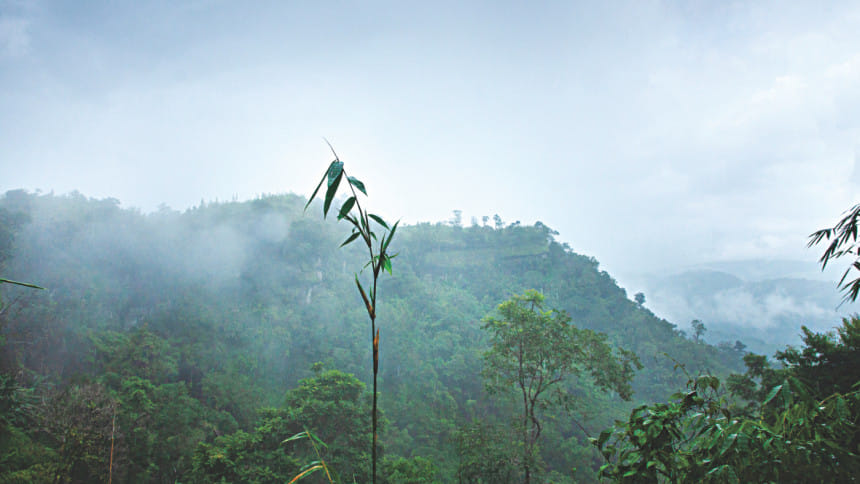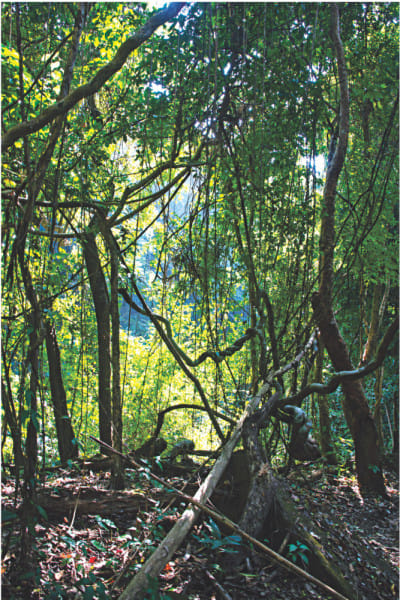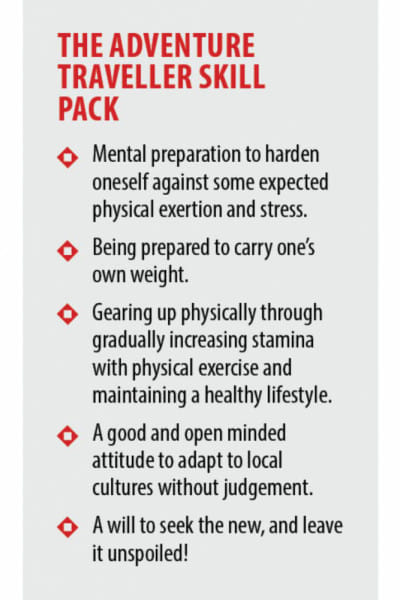Through the Traveller’s Eyes: Adventure in Bangladesh

One chilly winter night nearly 20 years ago, a group of young men carefully herded a bunch of young children over dark dirt roads in a remote-ish village. The moon was out in its full glory, breaths fogged up. The destination of this ragtag party was a grove of date-palm trees. The bounty— jars of fresh "khejur er rosh"— sweet, cold juice slow-harvested from the trunk of the tree. I was among those children, merrily hobbling along with my young uncles. The experience remains fresh in my memory, perhaps as my first taste of adventure.
Adventure travel is not only about the thrill and the excitement. It is also about self-discovery, pushing boundaries and limits, and understanding the varying depths of life.
"I splintered the bone of my big toe at the basecamp of the intimidating Friendship Peak in Himachal. As my group moved on towards the summit, I was left behind, in the quiet, undisturbed and remote part of a mountain, for the next seven days. All through this time, I relished the feeling of not having to make small talk with anyone, and just soaking nature and contemplating. The experience turned out to be among my most profound," said Samiur Rahman Turjo, an adventure travelling enthusiast. The travel bug got him good, as he started setting off toward the colloquial horizons, while still a student, and later, picking up freelance documentary making as a profession by dropping out of architecture.

Similar thoughts are echoed by Zaqiul Deep, now a freelance photographer, and for long, a passionate adventure traveller. "Travel for me is not only about the thrill, but also the serene, the understanding of nature, and harmony," he said.
"Moreover, considering the geographical and cultural context of Bangladesh, I believe that instead of 'big' projects, emphasis should be given on eco-tourism and community based tourism." It would be the most appropriate way to experience Bangladesh. Travellers want to immerse themselves into the local culture, cuisine, people, environment; that experience in Bangladesh should be from a rural village hut, rather than an air-conditioned hotel room. Here, one might argue that many people look for luxury and comfort while traveling, and this is the sector where big business happens. But I feel travelling has its own spiritual value, a deeper meaning— a traveller is more comfortable close down to the earth — they are happy as long as their very basic needs are fulfilled."
There will always be such amenities close to the city, or very far away from them in high-end resorts, helping big business. But eco-tourism and community based tourism help local communities develop on smaller scales, but many small projects add up to something big collectively, for more people, Deep explained, drawing on his own observations.
"We MUST also think about the impact — on nature, people and culture, of tourism. Bangladesh lacks facilities for backpackers and low-budget travellers — hostels, campsites, homestays, etc. though they can be easily incorporated within eco-tourism and community based tourism projects."
"I really appreciate the western notion of young people taking a gap-year before starting university, and travel around the world. Asia has always been a very attractive destination for them, because of the diversity and comparatively low cost of accommodation, food and transport. Bangladesh can easily become the next popular destination for them, if such facilities are provided. 'Backpacking' is also becoming very popular among the youth of Bangladesh as well, he explained.
"Even now, after all these years, I still get overwhelmed with emotions when I think about the hospitality I received from the beautiful people living in the hills. It is unbelievable how they opened up their homes to a virtual stranger like me, just wandering through their lands. I would sleep on just a blanket on the bamboo floor of their hut, have rice (harvested right there in the hills) and boiled vegetables with 'nga-pi' for meals. Believe me, I never felt any discomfort. They never expected any money in return and would in fact, get offended if I offered any. So I found myself helping them with their daily chores — and thus, got to realise what a deep connection the people still cherish with nature; leading very sustainable lifestyles, he explained.

"Big development would seriously hamper this. It would have a huge impact — environmentally, culturally, totally ruining the magical feeling of the areas. The recent trend of big groups going 'trekking' is adding to the problem. It is seriously disrupting the way of life of the locals. But it can easily be solved by enacting simple policies by the administration, not helter-skelter development – an easy example to emulate is that of Nepal."
Similar sentiments resonated in the words of Mohammad Samsul Arefin, one of the founders of a relatively new adventure group of travel enthusiasts, Group De Madventurers (GDM). Arefin himself is not new to the sector though, having made his way into the wilderness of Bangladesh's hills while still a student, quite a few years ago.
"I can now barely recognise the places that were some of my favourites back then. They used to be pristine, but now, the unchecked and non-regulated influx of tourists is leaving visible impact, not all of which is good. Prices of various services are artificially hiked up, and syndication is a real concern, especially ahead of any long holidays."
"There is no training or code of conduct for the guides to follow, even those who go through with the nominal registrations," said Tanvir Mreedul, another veteran traveller, adding that many travellers are also wantonly disrespectful, and sometimes unaware of the etiquettes of working with a guide.
There are also socio-political aspects to travel. Unchecked influence of tourists can be detrimental to the local cultures. "In many parts of Bangladesh, sexism and gender based discrimination is a real problem. Many hotels refuse to rent rooms to single female travellers. Yet, travellers also need to be mindful of not unnecessarily flouting local mores, and to respect the local traditions as much as is possible," Mreedul added.
Some of the biggest barriers to proper development of adventure tourism in Bangladesh arise due to the reluctant attitude of the authorities. "Formal administration is, and in a way also has been in the past, very unsupportive towards small groups of travellers who have always wanted to go deep inside the hills, for many different reasons — solitude, peace, thrill, adventure, self-discovery by being close to nature. Many areas are now declared off-limits; army and BGB camps strongly discourage these travellers from going to remote areas, and foreigners are almost never allowed in. These travellers however, are aware of the 'security' and safety issues, and the danger they put themselves in, quite happily too. I mean, you can't ask a climber to not climb a mountain because its 'unsafe,' it is absolutely absurd," Deep exclaimed.
All travellers truly appreciating nature are often of the same opinion — development in tourism is not for just the income, rather sustainability and protection of local ecosystem and people. In the hills, due to the increased demand by tourists for young bamboo shoot, as a local delicacy, almost drove the plant to localised extinction. The indigenous of the area took a unanimous decision to stop eating and serving it altogether, until the plants thrived again. There is a lesson to be learnt from that, Deep said.
Having said that, there is also a desperate need for creating awareness about the use of unsustainable and non-eco-friendly materials and waste management in the hills, after all, these are problems that tourism has created, and it should be how they are solved.

 For all latest news, follow The Daily Star's Google News channel.
For all latest news, follow The Daily Star's Google News channel. 



Comments